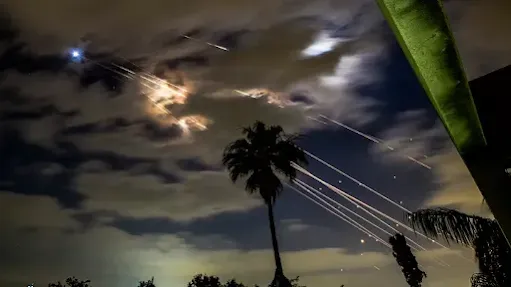As Trump and Netanyahu prepare for critical White House talks, Defense Minister warns Houthis of a 'heavy price'
Date: July 7, 2025 | By: America Bold Again Newsroom
In a significant escalation in the Red Sea crisis, Israel launched a series of powerful airstrikes targeting Iran-backed Houthi rebels in Yemen on Monday, July 7. The offensive comes in direct response to a suspected Houthi attack on a Liberian-flagged cargo vessel in the Red Sea, further heightening tensions in a region already plagued by maritime insecurity.
The Israel Defense Forces (IDF) confirmed that the strikes focused on key port cities including Hodeida, Ras Isa, and Salif, known Houthi strongholds and critical logistical hubs for arms transfers allegedly backed by Iran.
"These ports are used by the Houthi terrorist regime to transfer weapons from the Iranian regime, which are employed to carry out terrorist operations against the state of Israel and its allies," said the Israeli military in a press statement.
The Liberian ship reportedly came under attack involving explosive drones and small arms fire, which caused the vessel to take on water, forcing its crew to abandon ship. While the Houthis have yet to officially claim responsibility, Israeli intelligence sources link the group directly to the maritime assault.
Israel's air assault also targeted the Galaxy Leader, a commercial vessel seized by Houthis in 2023 and later retrofitted with surveillance systems used to track and target international shipping vessels. The IDF claims the ship was a critical tool in the Houthis' naval strategy.
Houthi Retaliation and Military Standoff
Following the Israeli strikes, the Houthis responded with a missile barrage toward southern Israel, though no casualties were reported. Israel has vowed to escalate further if attacks continue.
"Anyone who raises a hand against Israel will have it cut off," declared Israeli Defense Minister Israel Katz. "The Houthis will continue to pay a heavy price for their actions."
Meanwhile, Houthi military spokesperson Brig. Gen. Yahya Saree warned that his forces are prepared for a "sustained and prolonged confrontation" and pledged to maintain a naval blockade on the Red Sea shipping lanes, a vital global trade route.
U.S. officials have long warned about Iran's direct support for the Houthis. Gen. Michael Kurilla, head of U.S. Central Command, recently told Congress that without Iranian weapons and funding, "the Houthi threat would die on the vine."
Geopolitical Implications Ahead of Trump-Netanyahu Meeting
This latest flare-up occurs just hours before a high-stakes meeting between former U.S. President Donald Trump and Israeli Prime Minister Benjamin Netanyahu at the White House. The agenda is expected to focus on counterterrorism strategies, regional security, and bolstering U.S.-Israel defense cooperation.
The Red Sea conflict is likely to dominate discussions, with both leaders under pressure to stabilize a rapidly deteriorating security situation that threatens international shipping and energy supplies.
International reactions have begun to pour in, with calls from the United Nations and European Union urging restraint and diplomatic dialogue. However, with rhetoric intensifying on both sides, military escalation appears likely in the short term.
Conclusion: A Crisis with Global Ramifications
As Israel and the Houthis continue to trade fire, the security of the Red Sea and broader Middle East hangs in the balance. With world powers watching closely, the conflict poses growing risks to global trade, regional peace, and international diplomatic relations.
The situation remains fluid, and further developments are expected following the Trump-Netanyahu summit.
Stay tuned to America Bold Again for continuing coverage of the Red Sea crisis, Israel-Houthi conflict, and U.S. foreign policy developments.


Comments
Post a Comment